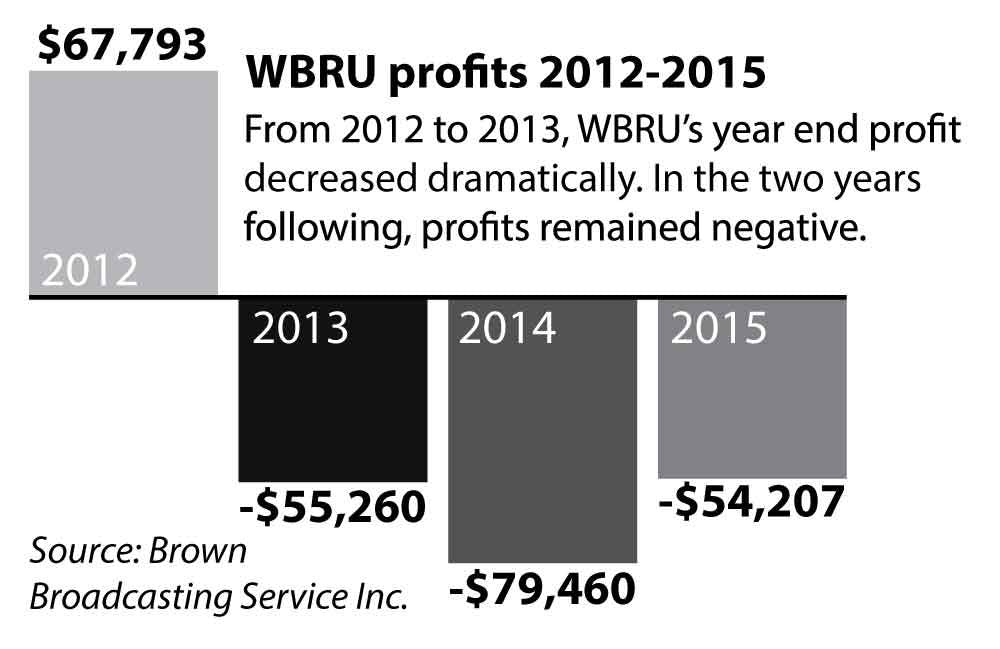The student membership of radio station WBRU will vote on whether or not to authorize the exploration of the sale of their FM license Saturday. This vote follows the board of directors’ unanimous vote in January to look into this option and a “straw poll” vote of student members who supported the same, The Herald previously reported.
“A vote Saturday to authorize the sale does not mean that there will be a sale,” said Ted McEnroe ’89 MAT’92, a member of WBRU’s board of directors.
In January, the board of directors voted to authorize the station to “begin reviewing the possibility of selling the station. In order to even move forward to explore that, it needs to be approved by the station members,” McEnroe said. The board of directors will look into multiple options in order to “ensure the long-term viability of the student workshop,” he added.
The station, which had an operating budget in 2015 of $1.38 million, has been losing money since 2012, McEnroe said. In 2015, WBRU accrued $54,000 in losses, a decrease from the $79,000 it lost the year before, according to WBRU’s IRS 990 Form.
According to a “WBRU FAQ and Fact-Checking” document created by current staff members of WBRU obtained by The Herald, “WBRU has always been, first and foremost, a student workshop. … In the past, the student experience and the goals of the business were much more closely related, so the distinction between the workshop and the business was not relevant to those involved in the station at the time.”
Though “radio is not dead,” the student workshop has felt the negative affects of a decline of the radio industry, especially for the younger listeners, according to the document.
“WBRU is much easier to run in a growing market than in the declining market we have faced for the last decade and will probably be facing forever if we stay with the same basic operation targeting young adults,” the document stated.
“The board and the students have spent years looking at this. We are determined to find the solution that is the best thing for the student workshop,” said Kishanee Haththotuwegama ’19, the general manager of the station. Haththotuwegama supports looking into the sale to be able to explore all options, she said. No plans have been laid out should the license be sold.
McEnroe pointed out that financial issues are not the only problems the station faces. “There are questions as to how vibrant and strong the student workshop is when it’s focused on terrestrial broadcast radio in 2017,” he said. The board wants to come up with a solution that “addresses both the shorter term financial concerns … but also the longer term ones of making the student workshop — the organization — something that students want to be a part of and will dedicate time and effort to,” McEnroe said.
Anna Horowitz ’19 a DJ for WBRU who also works on the promotional and events team agreed the station is struggling to maintain student interest. “Since people don’t necessarily want to go into radio, they’re not going to come and work at BRU,” she said. “As a student group, we’re starting to fade.”
“WBRU is an extraordinary, rare, precious institution” said Bill Lichtenstein ’78, a former program director at WBRU. “It is the pre-eminent student radio station in the country, but it’s also a formidable commercial station and has produced an extraordinary string of professionals,” he added.
“The vote to sell before you have a plan seems like (putting the) cart before the horse,” Lichtenstein said. When Lichtenstein saw that the student members of the station had done a straw poll vote along with the board of directors’ official vote in favor of selling the station, he responded with a letter posted in the “I worked at WBRU” Facebook page.
“I don’t want to sell BRU at all. I’m very against it,” Horowitz said. “The fact that the board hasn’t put in place a plan for what we would do with the money after we sell … scares me.” Horowitz fears alums and current listeners would lose their loyalty to WBRU if the license is sold, she added.
“What I still don’t fully understand — especially now that you have an outpouring of (alums) clearly stating the value of working at and operating a real major media outlet and who have offered to help in so many ways — is the urgency to vote to sell,” Lichtenstein wrote in his post.
“We have no digital presence,” Horowitz said. Rushing to sell before building up a stronger digital platform would force WBRU into losing much of its current following, she said.
Since WBRU made the student straw poll vote public, “so many more (alums) have come forward offering to help” make alternative plans to selling, Horowitz said. Horowitz has been in correspondence with one alum who created a task force to find alternatives and was involved in turning the station around in 1992 when the board wanted to sell the license then.
“All media outlets in the world right now are struggling with how you bring traditional media into the 21st century. It is a very difficult prospect and process,” Lichtenstein said. In order to succeed, media outlets need to have both a “bonafide news outlet along with a vigorous new media presence,” he added.
WBRU is owned by the non-profit Brown Broadcasting Services, which started in 1962 and operates independently from the University. The governance is composed of three parts: the board of directors, which is composed mostly of WBRU alums and serves as the overseeing body; the executive board of student leaders and the student station membership. There are about 50 station members, and all have to apply and take a test to join. Important decisions must be made by both the student station members and the board of directors who “co-exist,” McEnroe said.





